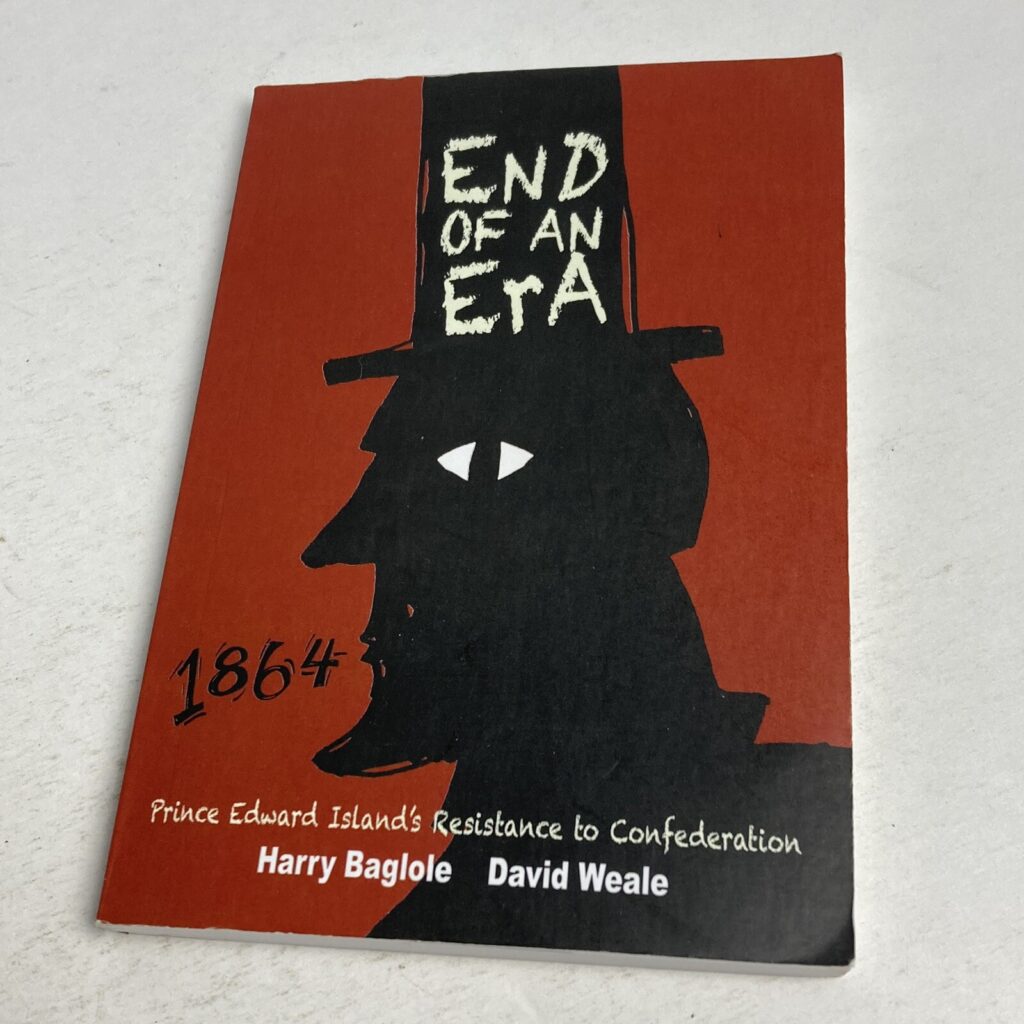Insights from Island History Book: End of an Era

I’ve just recently had the pleasure of reading my first Island history book, End of an Era, and thought it would be nice to share some of the more interesting insights that I gained.
The book is written by two prominent Island historians and former UPEI professors David Weale and Harry Baglole. The first edition was written as a counter-argument of sorts to the Centennial Celebrations of 1973 that marked the Island’s entry into Confederation.
This is not the first time I have heard of a counter-narrative in regards to Confederation, but I never took it seriously. Just look around, the people today love centralized government; perhaps there were a few dissenters at the time, but it seems impossible there could have been widespread opposition.
Judging by the evidence presented by the authors, calling Islander’s resistance to Confederation widespread is to do a disservice. Opposition was overwhelming with then Premier J.C. Pope stating “ninety-nine out of every one-hundred of the people are against Confederation,” an assessment newspapers at the time seem to confirm.
The book is a brief history of the Island from its inception as a British colony right up to Confederation; it chronicles the stories of the men who came to the Island and the struggles they endured to build a civilization out of a wilderness. I was blown away by the character of Islanders Pre-Confederation. The authors are endlessly quoting newspapers, diaries, and speeches by Islanders that give the reader a feeling of witnessing the events live as they are happening.
Below are some of the more amazing insights I gleaned.
The Triumph of Early Settlers
It’s hard to imagine what it took to establish the first communities here in PEI. Today you can go down any highway on PEI and see an endless sea of rolling farm fields, all neatly arranged in squares, often separated by a thin row of trees meant to delineate one field from the next.
The first settlers did not obviously find land so neatly arranged for farming when they first came, they had to clear away the forest by chopping down trees; then perform the hard labor of removing the stumps. All in the hope they could plant crops that would prove bountiful enough to sustain them. For some, their hopes did not materialize and there is suspicion that some of these early settlers starved to death.
It’s an incredible story of perseverance, which is why I find this whole business of “land acknowledgements” so ludicrous along with this perverted push of having white European ancestors refer to themselves as “settler” in a disparaging tone.
European descendants should look back in awe at the men who brought civilization to the Island, not shame.
An Opinionated Bunch
When Confederation was first proposed to the Island, the population is estimated to have been around 85,000 people — less than half of what it is today. And yet, it seems every corner of the Island had their own voice.
The Islander, The Monitor, The Herald, The Examiner: these are just some of the publications running during the time. I get the sense that Islanders took pride in forming their own opinion and coming to their own conclusions based on the merits of whatever proposition they were looking at. After having come to their own opinion, they seemed excited about sharing it.
I guess I sympathize with that, which is why I run a blog under my own name.
A Fierce Need for Independence
Islanders were proud of the society they had built, they valued their independence and when rumors started circulating that the Colony would be annexed to Nova Scotia they became agitated.
J.W. LeLacheur of Murray Harbor declared to great cheering “if we wished to possess the power of governing ourselves and become a free and independent people, we must cease to depend on the mother country for the payment of our officer’s salaries.”
Contrast this fierce spirit, if you will, with the view shared by all provincial political parties today that clamor for the federal government to provide hundreds of millions of dollars more to initiate a guaranteed income for every Islander.
Epilogue
The man that inhabits the Island today is almost unrecognizable from the one prior to Confederation.
It’s fair to say the man prior to Confederation has died; his descendants have forsaken him. You can still hear is echo sometimes, maybe even glimpse his ghost if you look hard enough, but he is still gone.
Only the idea of the man remains, captured in archives for any member of posterity curious enough to look, and in the history books like End of an Era.
The man may die, but the idea remains, ready to be taken up again if it’s deemed worthy.